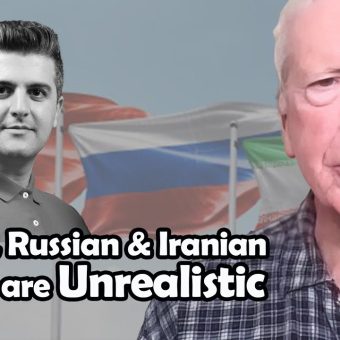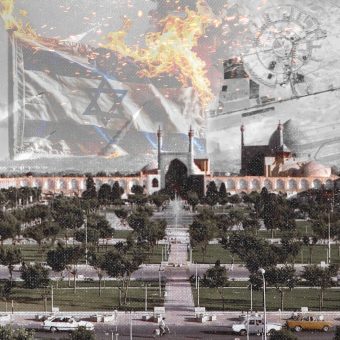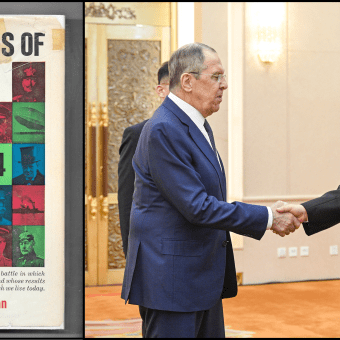Russia and The Holy Land
A continuation of the thought of “Zionism, Arrogance & World War III” — why a rising Orthodox Russia is fated to bury both Messianic Judaism and the hired western muscle in the Holy Land — from the perspective of geopolitics and geoeconomics. The eschatological consequences of lose-lose predicaments are profound
By Jamal Wakim at Al Mayadeen.

What is happening in the Middle East is a major battle centered on the main axis: Palestine
Gamal Abdel Nasser announced in 1969 that the battle on the banks of the Suez Canal would decide the fate of the world. This piece explains how.
Russia’s victory in struggle with collective West will be achieved in Middle East, not Eastern Europe
This article discusses the importance of what is happening in the Middle East and the battle taking place there specifically in the region extending from Egypt in the west to Iraq in the east to determine the fate of the world. When we talk about this region, there is a connection between the battle taking place in the Middle East and the battle that has always been taking place in the heart of Eurasia, specifically against Russia.
In the past two centuries, Russia was the one facing the so-called collective West, and it was the spearhead in confronting this collective West. In the early nineteenth century, this collective West was represented by Napoleon, and after that, during World War II, the collective West was represented by Nazi Germany, and after World War II, the collective West was represented by the United States of America.

Napoleon and the Grande Armée retreat from Moscow, 1812
Experience facing Napoleon
In the face of Napoleon’s invasion, we must understand that there was a project for this collective West, represented by global hegemony, and this collective West began its attack in Egypt and the occupation of Egypt in the year 1799. France’s failure in Egypt two years later was what determined Napoleon’s fate, and therefore his defeat was a matter of time in the confrontation against Russia. After that, Napoleon did not succeed in isolating Russia after the Battle of Austerlitz in December 1805, despite his victory in this battle. After that, Napoleon had to invade Russia in an attempt to subjugate it, and in this way, he recruited an army from various parts of Europe to begin his invasion of Russia.
On June 24, 1812, and the following days, the first wave of the multinational French Grande Armée crossed the Niemen River, beginning the French invasion of Russia. Despite the great advance of the French forces inside Russian territory, and despite their tactical victory over the Russian army in the Battle of Borodino, and then Napoleon’s occupation of Moscow itself, he was unable to achieve victory over Russia and began his withdrawal five weeks after his entry into Moscow, only to be defeated tactically in the battle. Bonaparte began his retreat before the Russian forces, which pursued him until Paris, where he was forced to abdicate and accept exile to the island of Elba, off the coast of Corsica. Despite his desperate attempt to return to power in early 1815, Napoleon was actually defeated by Russia, but his strategic defeat had begun with his failure in Egypt a decade and a half before that date.

German Field Marshal Erwin Rommel at El Alamein, Egypt, 1942
World War II experience
Then, during World War II, Nazi Germany launched a military campaign in North Africa as part of its larger strategic goals. This campaign, led by General Erwin Rommel, was known as the North African Campaign. However, Nazi Germany’s primary focus in Eastern Europe was not initially directed toward the Russian heartland. Instead, it invaded Poland in 1939, which led to the outbreak of the war in Europe. Later, in June 1941, Germany launched Operation Barbarossa, a massive invasion of the Soviet Union, with the intention of capturing key cities like Moscow and Leningrad.
At the time, the advance of Erwin Rommel’s forces in North Africa constituted an attempt to isolate it and reach the Suez Canal and cut off British access to the Middle East. In parallel, Nazi forces had begun to invade the Soviet Union on June 22, 1941. They advanced toward major cities like Leningrad, Moscow, and Stalingrad; where they faced tough resistance from the Soviet military and encountered numerous logistical challenges due to the vastness of the territory and the harsh conditions. But it was Erwin Rommel’s failure in the Middle East that sealed the final failure for Nazi Germany, and it was only a matter of time before Nazi Germany was defeated.
Rommel’s defeat at the Battle of El Alamein in the fall of 1942 represented a colossal failure. Therefore, this defeat in the Middle East was followed by the Soviet victory in the Battle of Stalingrad in February 1943. The Battle of Stalingrad weakened the German army and boosted Soviet morale, contributing to the eventual Soviet counteroffensive. Then, the Battle of Kursk occurred in July 1943 and was a major offensive launched by Nazi Germany against the Soviet Union. The battle ended in a decisive Soviet victory and marked the beginning of a series of successful Soviet offensives that pushed German forces back toward Eastern Europe. The defeat of Nazi Germany was announced in May 1945.
Brezhnev’s geopolitical shortsightedness
The Soviet Union emerged victorious in the war against Nazi Germany, only to find itself facing the United States, which would take the banner of leadership of the collective West from Nazi Germany. According to the divisions of the Yalta Conference, the Soviets expanded their influence into Eastern and Central Europe, securing a defensive depth in the heart of Russia. But Soviet leader Joseph Stalin did not have the opportunity to reach the eastern Mediterranean after the defeat of the communists in Greece in the civil war in 1947, nor did he have the opportunity to reach the Adriatic Sea after a dispute broke out with Yugoslav leader Josip Broz Tito, who accepted generous offers from the West to stay away.

“The Leader and the Nationalization of the Canal” (1957) by Egyptian artist Hamed Owais
About the bloc of socialist countries
Here, the United States began to encircle the bloc of socialist countries by establishing NATO in 1949, which was supposed to besiege the communist bloc and contain the communist influence in Southeast Asia. The Baghdad Pact, also known as the Central Treaty Organization (CENTO), was established in 1955 among Iraq, Turkey, Iran, Pakistan, and the United Kingdom. It aimed to foster cooperation and mutual defense among its member states, particularly in the face of perceived Soviet expansionism and influence in the Middle East. However, the main target of the United States was to attack the Soviet interior. What hindered this plan was the coup led by Gamal Abdel Nasser in Egypt, which brought him to power. Abdel Nasser declared his blatant opposition to the policy of Western alliances and declared his own policy of non-alignment in the Cold War, and, at the same time, he began to take rapprochement initiatives toward the Soviet Union and the bloc of socialist countries in order to balance Western support for “Israel”. After his victory against Britain, France, and “Israel” during the tripartite aggression, Abdel Nasser was able to overthrow the Baghdad Pact in 1958 after the coup that he supported against the Hashemite monarchy in Iraq in the summer of 1958.
The Soviet rapprochement with Abdel Nasser contributed to opening the African arena to the growth of African-Russian relations and led to the liberation of African countries from Western colonialism.
But after the year 1965 and the coup against Soviet leader Nikita Khrushchev in the Soviet Union, the arrival of a bureaucratic class with a “Eurocentrism” orientation in the Soviet Union that gave priority to Moscow’s relations with Europe led to the neglect of Soviet-Arab relations and pushed them to second place in terms of importance. What made matters worse was the communist dogmatism of short-sighted Soviet leaders, which made them neglect the geopolitical dimension. Unfortunately, during the Cold War, the Soviet Union, and specifically the leadership that took power after 1965, did not realize the importance of what was happening in the Middle East as a result of its European-centric vision. Therefore, they were content and happy with what was happening with their share of influence in Eastern and Central Europe, and they neglected their influence in the Middle East.
After 1965, the United States took advantage of the short-sightedness of the new Soviet leadership to resolve the battle in the Middle East. The defeat of the Arab countries in 1967 was not against “Israel”, but it was in fact against the collective West, primarily the United States of America, which supports “Israel”. It also constituted the first major defeat for the Soviet Union. Then, the American attack began in Eastern Europe via the destabilization of Czechoslovakia and Poland. And when the Soviet Union left the region, and after Egypt turned toward the United States under Anwar Sadat, the issue of defeating the Soviet Union was only a matter of time. This brings us back to what the late Egyptian leader Gamal Abdel Nasser said in 1969 when he announced that the battle on the banks of the Suez Canal would decide the fate of the world. Therefore, the defeat of the progressive Arab countries, led by Egypt, constituted a defeat for the Soviet Union as a whole, making it lose strategic superiority in favor of the United States, which began achieving one victory after another, leading to victory in the Cold War.
In summary
Now what is happening in the Middle East is also a renewed attempt launched by the collective West, led by the United States, to win global hegemony. They began this attack by occupying Afghanistan in 2002, then Iraq in 2003, before heading to the Russian heartland. They began their attack in Afghanistan, occupying Afghanistan, and then invading Iraq, only to begin shortly after the process of the so-called “Arab Spring” aimed at changing regimes through the use of soft power. After the outbreak of the “Arab Spring”, an indirect war was launched against Russia in the year 2014. Therefore, what is happening in the Middle East, in my estimation, is that any victory in Eastern Europe will not be decisive until the Middle East is done, and, therefore, the Eurasian powers led by Russia must focus their attention on the battle currently taking place in the Middle East because this is the one that could end American influence.
If the Americans win this battle, all the victories that Russia could achieve in Ukraine or Eastern Europe will have no strategic benefit, because the main battle would have been lost, as it happened during the Cold War. Therefore, in the year 1969, during a visit by the late Egyptian President Gamal Abdel Nasser to the Suez Canal, when Sinai was occupied and the Israeli enemy was on the other side of the canal, he said that on the banks of the Suez Canal the fate of the world was decided, and unfortunately the fate of the world was decided not in our favor, but in their favor. What he meant was the American hegemony with the collapse of the Soviet Union.
Now, the focus must be on this battle. What is happening in the Middle East is a major battle centered on the main axis: Palestine. What is happening in Palestine is something mentioned in religious books. I may have my own interpretation. Hence, we find that some of the signs mentioned in the Bible are being witnessed now: the killing of children at the hands of Rhodes two thousand years ago is being repeated at the hands of Netanyahu in Gaza. The attempt to deport the Palestinians to Egypt is similar to the story of the Virgin Mary and her son Jesus taking refuge in the land of Egypt. It is worth mentioning that the Resistance in Palestine receives assistance from Iran, similar to the gifts that the Three Magi gave to the child Jesus in the cave. Note that what led the three wise men to the cave was mainly the North Star seen in the Middle East as Russia. Could it be a sign that guides the current Russian leadership toward the region to achieve a decisive victory in the contemporary battle of Armageddon?
Related Posts
-

Chinese, Russian and Iranian Leaders are Unrealistic
April 27, 2024 -

Abu Obeida’s Revolutionary Message
April 25, 2024 -

An Overdue War
April 25, 2024 -

Wars for Peace
April 25, 2024 -

Another Nail in Israel’s Coffin
April 24, 2024 -

The War against the BRICS
April 23, 2024 -

Hezbollah wades in
April 23, 2024 -

‘All for one and One for all’
April 23, 2024 -

Accelerants of Armageddon
April 22, 2024 -

The Iraq War Wasn’t About Oil
April 22, 2024


Well, this piece sets the mind to thinking – some very interesting threads you’re pulling into the global geopolitical mix. What is the value of Egypt? And what is the value of Yemen, come now to show that the Suez Canal can be controlled from two ends of the Red… Read more »
Thanks for that elucidation! I agree, hitherto, Egypt was of paramount importance. Egypt may have swung the Saladin-led Resistance during the first Crusades with the interdiction of their Navy, cutting sea lanes and vital logistics as do the Yemenis today.. the Pirates learned their lesson and have focused on Egypt… Read more »
Yes it is a really interesting perspective that i’ve not seen before. Perhaps this explains why Russia has been ever so slow and cautious to enter the fray in West Asia, what was undone in post soviet times can’t be magically restored in an instant.
Well, and that aspect of slow and cautious may simply be the steady working with a situation that is vastly larger than appears on the surface. Given that the Resistance praises Russia to the skies, and that all of its factions foregather in Moscow to share planning, maybe Russia’s movements… Read more »
We saw documentation several months ago of Russian fixed outposts on and patrolling of the Golan border. Here’s more on Russian-Syrian moves against the Anglo-Zionists on occupied Syrian lands (Idleb) and deterring against aerial aggression.
https://m.youtube.com/watch?v=VsNfVt3MBdk
Cold war wasn’t won by the US. It’s just that the treacherous scum of the Soviet Union betrayed their own country and people in dismantling their country.
The perceived victory of the US was short lived.